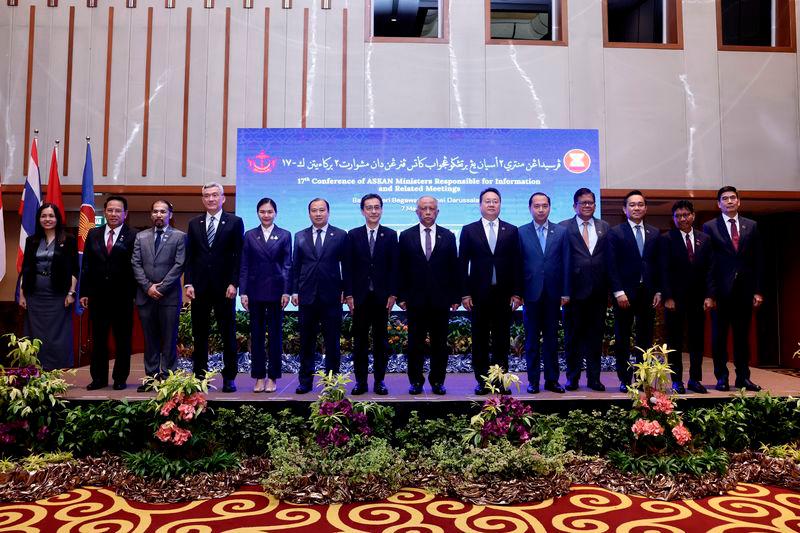BANDAR SERI BEGAWAN: The 17th Conference of ASEAN Ministers Responsible for Information (AMRI) and Related Meetings concluded with strong backing for the ‘Kuala Lumpur Declaration on Safe and Responsible Use of Social Media Platforms for ASEAN’.
In a joint media statement issued at the end of the conference, ASEAN reaffirmed its collective commitment to cultivating a safe, inclusive, and responsible digital environment across the region.
“The meeting reaffirmed the importance of promoting a resilient and people-centred ASEAN Community by addressing the challenges posed by the misuse of social media, including the spread of disinformation, hate speech, and online exploitation,” the statement read.
Ministers also highlighted the vital role of ASEAN’s information sector in fostering collaborative engagement with key stakeholders, including social media platforms, to craft and implement practical measures to address harmful online content while safeguarding freedom of expression.
The meeting also acknowledged the ongoing development of the ‘Guidelines for Safe and Responsible Use of Social Media Platforms for ASEAN’, which aims to provide pragmatic strategies for enhancing online safety and promoting cyber wellness across member states.
According to the joint statement, AMRI also endorses the ‘Bandar Seri Begawan Declaration to Reaffirm the ASEAN Ministers Responsible for Information’s Commitment to Strategic Progress in Media and Information’.
The declaration underscores AMRI’s ongoing commitment to strengthening cooperation and elevating the role of the information and media sector in the ASEAN Community beyond 2025.
“Furthermore, the meeting recalled AMRI’s foundational objectives since its establishment in 1989, recognising the sector’s vital contribution to ASEAN’s development and its transversal role in supporting cross-cutting regional priorities,” it said.
The declaration also sets a strategic direction for enhancing the sector’s capacity in navigating digital era challenges, particularly in combating disinformation, managing the effects of digital transformation, the empowerment of youth as key drivers of innovation in media and communication as well as to promote the creative economy across the region.
In addition, AMRI commended the substantive progress in the implementation of the ASEAN Strategic Plan for Information and Media (2016-2025), recognising it as a conerstone for regional collaboration, enhancing public awareness of ASEAN and promote regional identity and resilience.
AMRI also acknowledged the ongoing development of the Work Plan for Information and Media (2026-2035), a successor roadmap designed to address the complexities of a rapidly evolving media landscape.
“The new Work Plan is expected to strengthen ASEAN’s ability to respond to emerging trends, including rapid digital transformation, technological innovation, disinformation, and the growing demand for inclusive and accessible media content, as ASEAN moves towards its Post-2025 Vision,” according to the joint statement.
The ministers also recognised the steady implementation of the ASEAN Communication Master Plan (ACMP) II (2018-2025), which has played a vital role in raising regional awareness and fostering a stronger sense of ASEAN identity among its people.
Building on these gains, AMRI noted the ongoing efforts to develop ACMP III (2026-2030), which aimed at building on current achievements and guiding strategic communication for future ASEAN community-building initiatives.
In tackling the pervasive challenge of misinformation, AMRI also acknowledged the work of the ASEAN Task Force on Fake News (TFFN) and underscored the need for stronger content moderation, enhanced self-regulation and closer collaboration with digital platforms to refine guidelines and harmonise policies across the region.
AMRI called on the TFFN and the three ASEAN Working Groups to continue aligning their efforts with the ASEAN Community Vision beyond 2025, emphasising the need to remain responsive to evolving trends such as digital transformation, technological innovation, and changing media consumption patterns.
The meeting also recognised the ASEAN Committee on Culture and Information (COCI) for its vital role in fostering ASEAN awareness and people-to-people connectivity through cultural and media initiatives.
COCI’s ongoing projects were lauded for complementing the work of AMRI and Senior Officials Responsible for Information (SOMRI), particularly in strengthening media capacities and advancing social inclusion, innovation, and regional resilience.
Looking ahead, AMRI stressed the importance of aligning COCI’s future efforts with the ASEAN Community Vision beyond 2025 to ensure continued support for cross-sectoral cooperation and sustainable development in the media and information landscape.
The meeting also reviewed ASEAN’s partnerships in the information and media sector, noting the successful completion of the ASEAN Plus Three Work Plan (2018-2025) and expressing anticipation for a successor plan that addresses digital and media innovation challenges.
Significant progress was also acknowledged in ASEAN’s media collaborations with China, Japan, and the Republic of Korea, alongside growing engagement with new partners such as Norway, Pakistan, and Turkiye, demonstrating the region’s expanding international media cooperation.
The joint statement also confirmed that the 18th AMRI and its related meetings will be convened in Cambodia in 2027.
The 17th AMRI and the 8th AMRI Plus Three Conference concluded today, following the 22nd Meeting of the SOMRI and its engagement with the Plus Three countries, and Japan, held from May 5 to 6.
All ASEAN member states, as well as Timor-Leste, China, Japan, the Republic of Korea and the ASEAN Secretariat participated in the meetings.
The Malaysian delegation to AMRI was led by Deputy Communications Minister Teo Nie Ching, while Communications Secretary-General Datuk Mohamad Fauzi Md Isa represented Malaysia at SOMRI.









